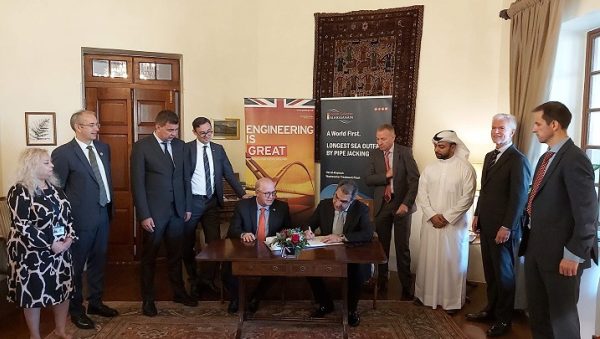- Value:
- £55m
- Sector:
- Infrastructure
- Client:
- Kuwait Ministry of Works
- Main Contractor:
- JGL and Al Hassanain JV
- Location:
- Kuwait
- Duration:
- 110 weeks
- The longest and largest tunnels built in the Middle East and one of the largest pipe-jacked sea outfalls in the world,
- Over 16 nationalities working on the project from all parts of the world,
- TBM recovered from 10m beneath the seabed of the Arabian Gulf in only four days.
Contact usTo hear about our experiences and how we can help you.
Project Overview
Kuwait is one of the few countries in the world aiming to recycle 100% of the wastewater produced by its population and local industry. The Umm Al Hayman Wastewater Treatment mega project is a $1.6 billion public private investment providing complete recycling for up to 700,000m3 of wastewater a day and 450km of waste collection together with a final effluent distribution network.
A joint venture between JGL and Bahraini marine contractor, Al Hassanain was formed in 2020 to construct a 6.2km long 2.4m diameter Emergency Sea Outfall (ESO) with three tunnels using state of the art pipe jacking methodology.

These are the longest and largest tunnels in the history of Kuwait. The 2km 2.2m diameter tunnel constructed under the coral sea bed of the Arabian Gulf is the longest sea outfall in the Middle East achieved by pipe jacking. The 4 day TBM recovery was extraordinary and is a massive triumph itself.
Challenges
With a project of this scale - challenges were inevitable, however having a fantastic talented and committed team deployed to deliver this project, the challenges were always overcome.
The Kuwait government imposed the most stringent Covid restrictions in the world resulting in 9 months delay to the project commencement due to 7 months blockage of borders and suspended flights, curfews without quarantines of residential areas and closed governmental offices (no visas, permits). Despite the above challenges our multinational teams excelled in the project's execution by deploying an additional TBM, quality outputs on tunnelling works and exceptional output on the open cut section 9-30m/day.
Added Value Contribution by JGL
We optimised hydraulic profiling via increased capacity, which led to reduced friction and bends, which was critical when introducing vertical curves in the onshore tunnel.
The project's carbon footprint reduction initiatives included the reduction of excavated material by the replacement of 1.4km open cut with a tunnel, eliminating large plant required for open cut, selected as dug material used for pipe surround and backfill, recycled water for compaction and dust suppression, use of local suppliers for Polycrete pipe and GRP fittings manufactured 10km from site, diverting from landfill 24,000m3 of tunnel arisings and improved production outputs of 50% less time on site.
The project's risk reduction initiatives including, the conversion from tunnelling to open cut, which reduced plant movements, fewer workers working in excessive heat, volume of deep trenches, eliminated working near 1000 KV power lines and multiple strategic water mains.
Innovation
Examples of Innovations which led to increased efficiency within our programme included:
- The development of bespoke pipe jack lubricant which reduced anticipated pressures by 80%
- The design and manufacture of bespoke marine lifting beam to allow air bag only recovery of TBM
- A precise route survey for 39km sub surface towing of the TBM - a world first.
Due to the complex nature and specialist skill set required to undertake this project, our team consisted of over 180 employees of 16 nationalities. To help integrate a multitude of diversities and cultures we developed bespoke training workshops using presentations and video animations to raise the awareness of construction, SHEQT by successfully embedding our award-winning LIFE Culture.
Programme, dedicated prayer rooms, promotion of multi-faith religious traditions, including feast and special prayers prior to TBM launches. English language courses were made available to help with the transition of personnel upon project completion for UK business integration. The culture established was crucial to the successful delivery of the project.
To hear about our experiences and how we can help you.
Explore related content










